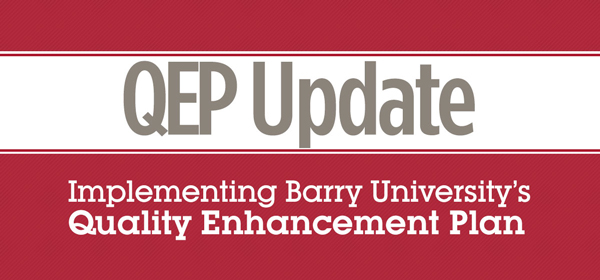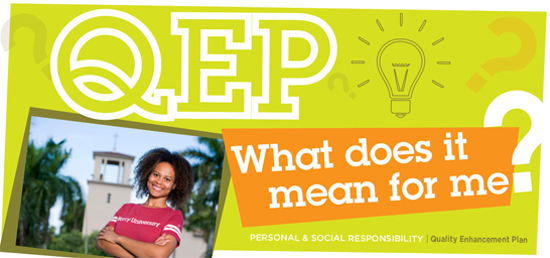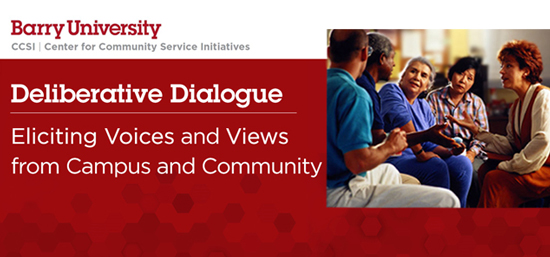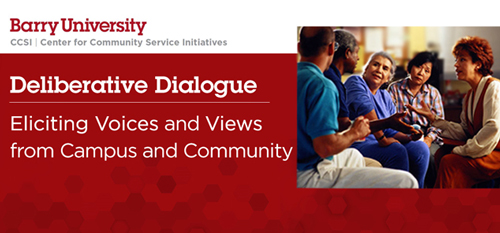|
|

|
Community Engagement Symposium to Feature Student Poster Competition
A Student Poster Competition will be a feature of this year’s Community Engagement Symposium. The purpose of the competition is to showcase and recognize students’ course-based and co-curricular work focused on social responsibility. Entries for the competition will be displayed during the Poster Session. Although any student, faculty, and staff member may participate in the Poster Session, the competition will be open only to undergraduates. Representatives of Barry’s Community Advisory Committee will serve as judges. They will use such criteria as content, relevance, and visual appeal to assess the entries. Scheduled for March 28, the Fifth Annual Community Engagement Symposium is being organized around the theme, “Demonstrating Social Responsibility through Experiential Learning.” The Poster Session is slated for Room 112 of the Andreas Building, from 1:45 to 3:30 p.m. Prizes will be presented during the Closing Session of the symposium, beginning at 3:30. Poster Session proposals may be submitted for optional review at any time between now and the extended deadline of February 1. Barry’s QEP is titled “Fostering Personal and Social Responsibility through Experiential Learning.” Key elements of social responsibility are identified as follows: “Becoming aware of the importance of contributing to the greater good; gaining civic knowledge and skills; and taking action with others to address issues affecting local, national, and/or global communities.” Experiential learning includes service-learning, community-based research, fieldwork, clinical rotations, study abroad, capstones, and internships. The social responsibility outcomes are linked primarily to the “community engagement and collaboration” category of the QEP. For additional information on the Poster Session, including the Student Poster Competition, contact the coordinator at qep@barry.edu or 305-899-3696. |
Committee to Test Students’ Knowledge of Quality Enhancement Plan
Students will test their knowledge of Barry’s Quality Enhancement Plan in a competition that kicks off next month. Entitled “QEP, What Does It Mean for Me?” the competition will include a web-based scavenger hunt, crossword puzzle, and other activities. “The competition will highlight various aspects of the QEP, which is designed to foster personal and social responsibility,” said Dr. Nickesia Gordon, a member of the QEP Implementation Committee. “It will help students to identify how the undergraduate curriculum and co-curricular activities support the QEP goals.” Gordon (Department of Communication), Larry Perez (Office of Student Life), and Dr. Leticia “Letty” Vega (Department of Biology) are members of the subcommittee coordinating the competition. The main prize will be a $100 Barry Bookstore gift card, with two runners-up receiving $50 Barry Bookstore gift cards. The top seven competitors will receive T-shirts highlighting personal and social responsibility. Open to all undergraduates, the competition will begin on February 5 and end on March 23. Prizes will be presented at the Fifth Annual Community Engagement Symposium on March 28. Additional information is available from members of the competition subcommittee – ngordon@barry.edu, lperez@barry.edu, lvega@barry.edu – and from QEP staff at qep@barry.edu. |
Deliberative Dialogue Series Continues on February 13
This academic year’s Deliberative Dialogue Series will continue on February 13 with a forum focused on the women’s rights movement from a contemporary perspective. Titled “Feminism Today: Inclusive Modern Movement or Outdated Relic?” the 90-minute forum will be held in Room 112 of the Andreas Building on Barry’s main campus in Miami Shores, beginning at 4 p.m. An all-female panel will discuss generational perspectives, the intersections of race and feminism, the Me Too Movement (#MeToo), and current efforts in the larger fight for gender equality. Community partners and faculty members will be among the panelists. Addressing HomelessnessThe first forum in the series, in November, addressed the issue of homelessness. To prevent homelessness, a comprehensive approach involving program implementation, service delivery, and advocacy is necessary. That was the main takeaway from the forum titled “Preventing Homelessness: Responding to the Challenge.” Community and campus participants saw the shortage of affordable housing as “one of the biggest challenges” and concluded that the Housing First model could be one of the best solutions to homelessness. Housing First is described as “a proven method of ending all types of homelessness” and “the most effective approach to ending chronic homelessness.” Promoted by the U.S. Interagency Council on Homelessness, Housing First offers individuals and families experiencing homelessness immediate access to permanent affordable or supportive housing. Without clinical prerequisites such as completion of a course of treatment or evidence of sobriety, Housing First has reportedly yielded higher housing retention rates, lower returns to homelessness, and significant reductions in the use of crisis service and institutions. The Deliberative Dialogue forum engaged students, alumni, faculty and staff members, and community partners in exploring the effects of such factors as lack of affordable housing, unemployment, mental health diseases, and substance abuse. The participants examined several methods of addressing homelessness before proposing specific solutions, including advocacy of development initiatives that make provision for affordable housing. “We need a frontal approach – an all-inclusive approach,” said Michael J. Calderin, chief operating officer of the Susan B. Anthony Recovery Center. He suggested that such an approach would encompass vocational training, job referrals, occupational therapy, supportive housing, and other programs and services. Dr. Cassandra L. Scott, a visiting assistant professor in Barry’s School of Social Work, similarly emphasized the importance of “a long-term, systematic response – not just an emergency response.” She also stressed the “need to elect public officials who will fight for change.” Scott, who has run a transitional housing program, called for “continuous advocacy and support for organizations addressing homelessness.” She suggested that community members “bridge the gap between lawmakers and those who are homeless.” Barry alumna Ruth Auguste shared her clinical case management experience at KID, Inc. in Broward County, where she is assigned to the HEART (Housing, Empowerment, Achievement, Recovery, Triumph) program. She said her caseload involved many persons who were “a paycheck away from becoming homeless.” Auguste recommended “a holistic approach” to the problem of homelessness. Joining Calderin, Scott, and Auguste on a panel of lead participants at the forum were Rose Anderson, a psychiatric nurse practitioner for Camillus Health Concern’s Lazarus Project, and Daniqua Williams, a Barry graduate student in the counseling program. Williams also is the QEP (Quality Enhancement Plan) project assistant. Anderson urged kind treatment of homeless persons who often panhandle near traffic lights. Williams, who is pursuing a master’s in counseling, shared part of her experience working as a counselor in a drug abuse treatment program in Tampa. During the deliberation, Barry Experiential Learning Coordinator Liz James drew attention to the efforts by a faith-based coalition called PACT (People Acting for Community Together) to tackle the shortage of affordable housing as a major issue in Miami-Dade County. She noted that PACT leaders recently decided to continue working with public officials and to hold them accountable for previous agreements made to improve access to affordable housing. Earlier, other forum participants suggested that housing be promoted as a human right and that increased emphasis be placed on the prevention of drug addiction and several mental illnesses, which contribute to homelessness. The dialogue moderator was Dr. Mitch Rosenwald, a Barry professor of social work and a licensed clinical social worker. Courtney Berrien, associate director of the Center for Community Service Initiatives (CCSI), thanked the community and campus participants for contributing to a thought-provoking and productive forum. The CCSI organizes the Deliberative Dialogue Series as a method of civic learning and engagement in addressing social issues of current concern. The series brings together campus and community stakeholders to weigh perspectives about the issues and to work toward practical solutions.
Co-curricular programs, projects, and events that carry the “PSR” are geared to achieve at least one of the six personal and social responsibility outcomes of the QEP. The outcomes are categorized as (1) Ethical and Moral Reasoning, (2) Engaging Diverse Perspectives, and (3) Community Engagement and Collaboration. Each category contains two specific student learning outcomes. Deliberative Dialogue forums fulfill three student learning outcomes — two in the “Engaging Diverse Perspective” category and the third in “Community Engagement and Collaboration.” |
Resources Available at QEP WebsiteThe QEP website has information on a variety of resources to support the implementation of Barry’s Quality Enhancement Plan. The resources include scholarly articles, books, fact sheets, and other publications on experiential learning, civic engagement, social responsibility, and similar topics. A video that illustrates key concepts of the QEP is also available at the website. The key concepts are responsibility, community, social justice, civic engagement, service, and diversity. Barry’s QEP is focused on personal and social responsibility through experiential learning. For further information on the QEP and to access experiential learning resources, contact QEP Director Dr. Glenn Bowen at qep@barry.edu. |
|
If you wish to unsubscribe or update your email subscription, please visit our email preference center. ©2017 Barry University. All Rights Reserved. |




